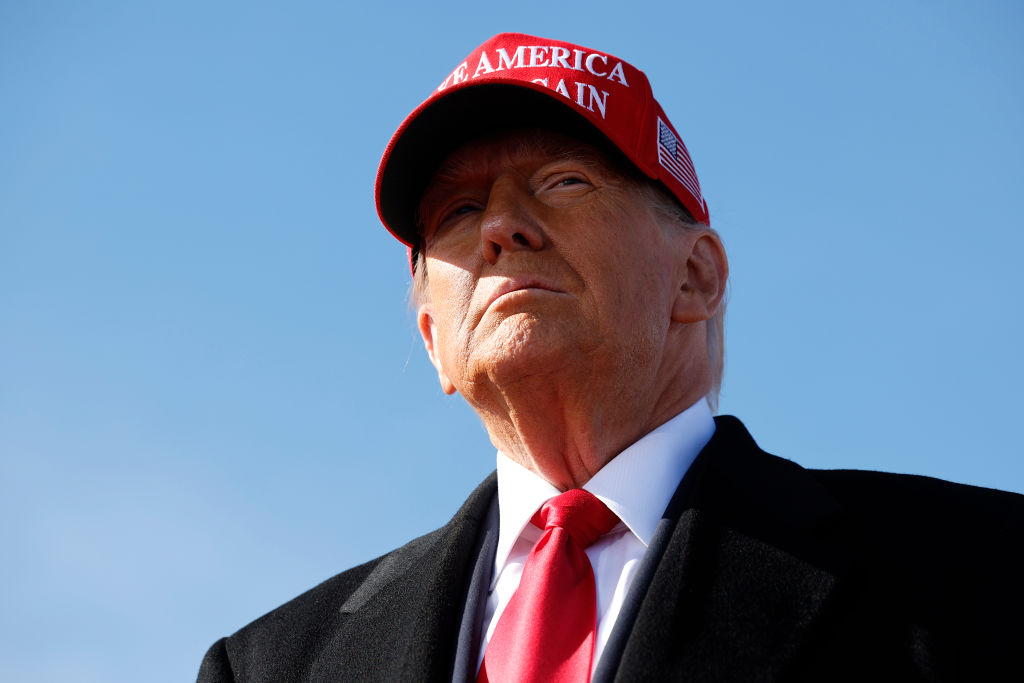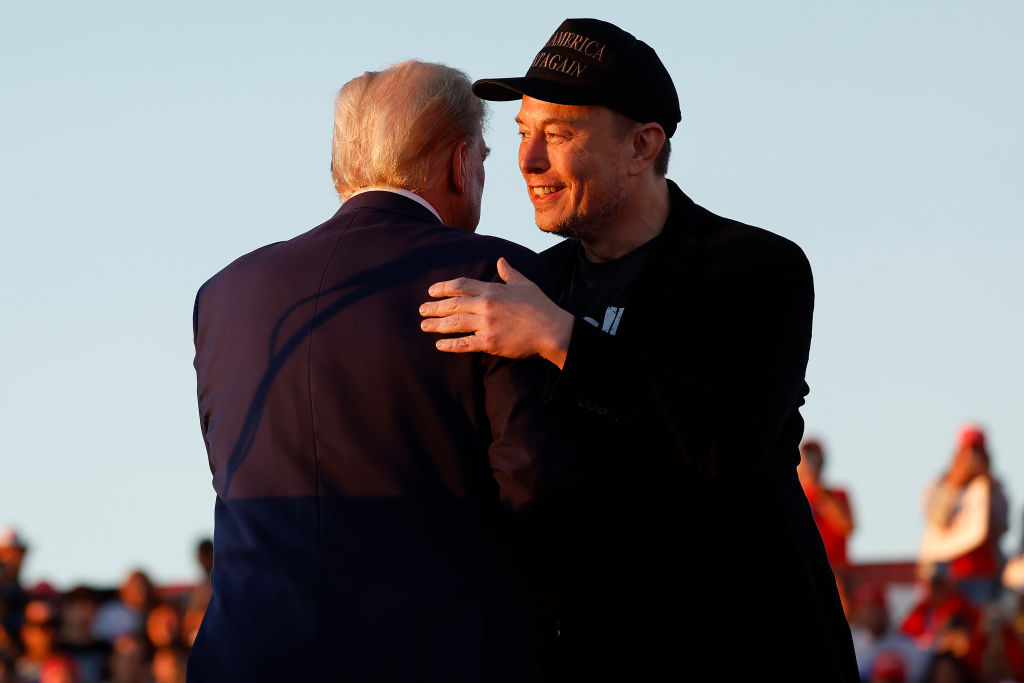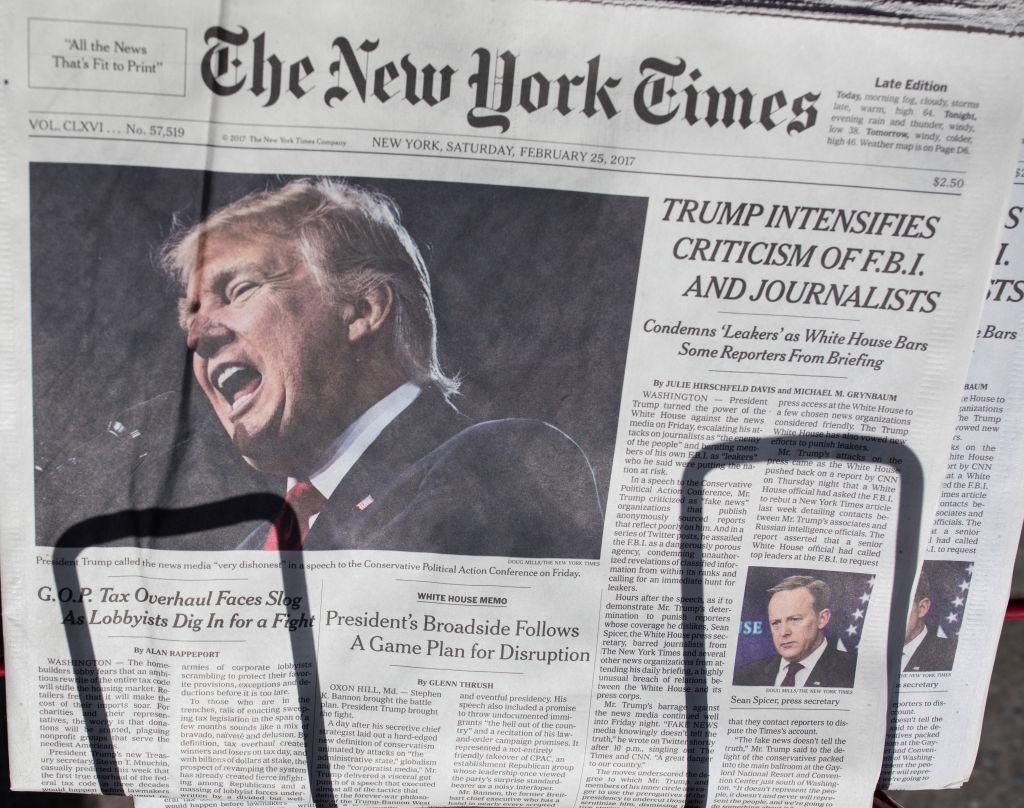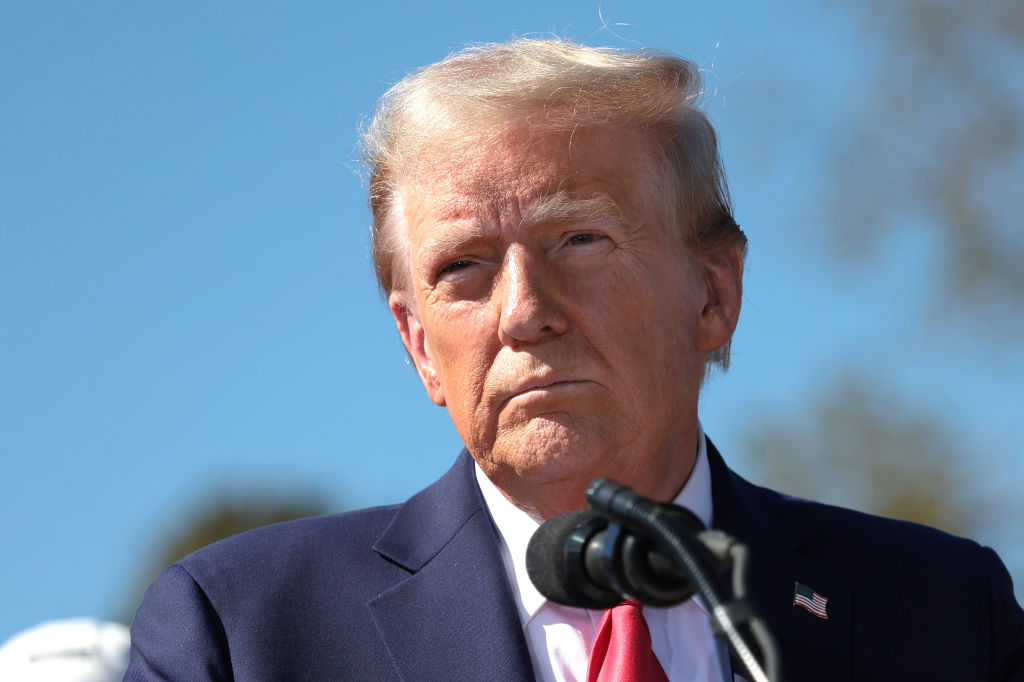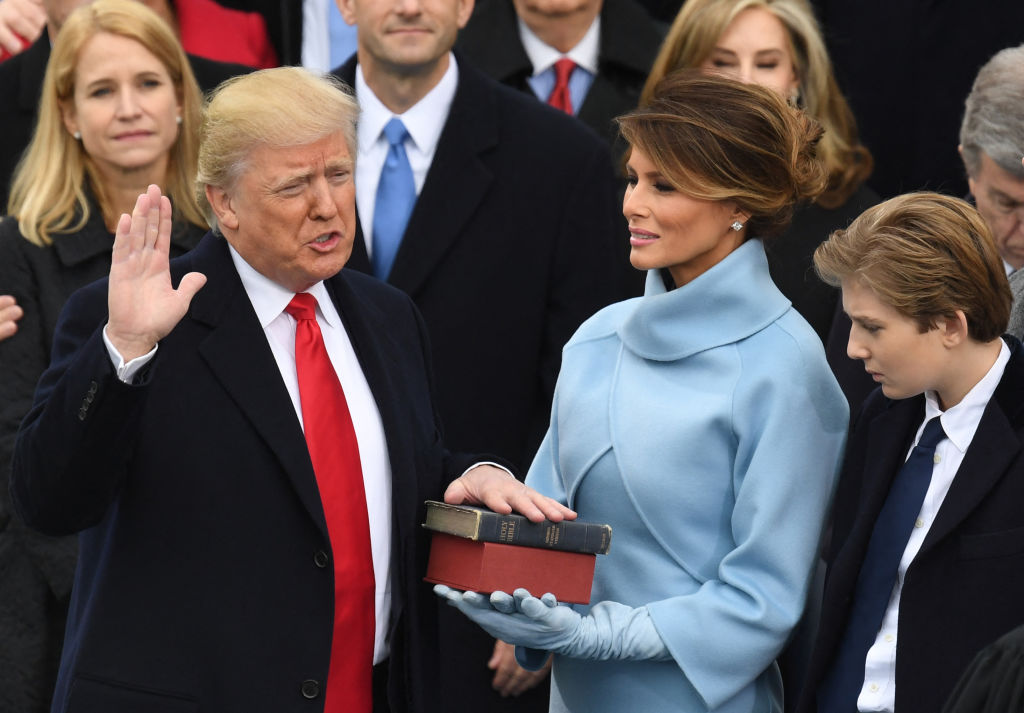He should fortify and restore democracy.
What Trump Should Do If He Wins
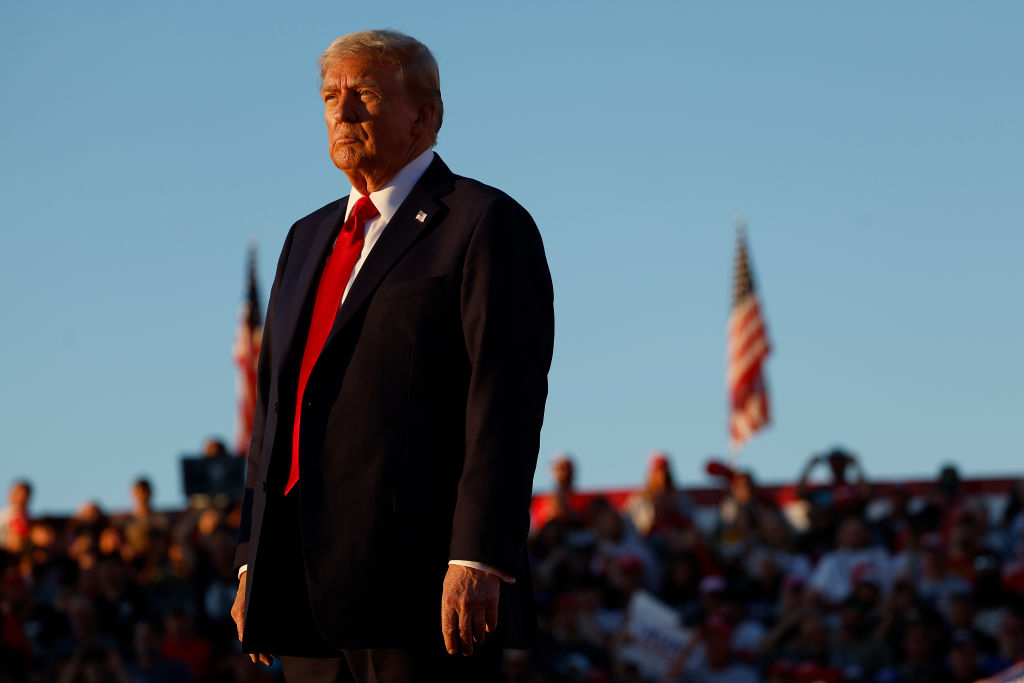
His agenda must revolve around recovering the practices of self-government.
If Donald Trump wins in November, he won’t have four years to enact his agenda. He’ll have one: 2025. Trump’s political capital will never be greater during his second term than at its start, most likely backed by Republican control of the House and Senate. The most stressful, most painful—and most important—domestic initiatives of Trump’s presidency must be pursued and substantially accomplished in his first year back in office.
Early in 2026, Republicans in Congress will start thinking more about their own survival in the midterm elections than about the president’s policies. Some of them will be thinking almost exclusively of themselves before that, too, but Congress will only grow more risk-averse during the administration’s second year. Since 2026 is also America’s semiquincentennial—marking the 250th anniversary of the Declaration of Independence—it will be a time for celebration and education. This presents Trump the opportunity to use his bully pulpit and the prestige of executive office to win the American Revolution anew, this time in the culture war for our nation’s self-understanding. The necessary work of restoring Americans’ pride in their country, its principles, and its history luckily doesn’t demand superhuman courage or discipline from Congress. The president can lead the nation in historical and philosophical reflection, guiding Americans toward recovering the mind and spirit of ’76.
If the midterms produce a swing away from the president’s party, Trump should begin the second half of his term prepared to offer the nation a stark choice between his vision and that of a hostile, obstructionist Democratic Congress. The historical probability of the Democrats taking control of the legislative branch in 2027 makes it even more imperative that President Trump achieve his highest aims, and make excellent and enduring judicial and executive appointments, two years earlier. The third year of his term will be a time to draw battle lines for the future. And the fourth year, 2028, will determine the immediate fate of all Trump has achieved, as Vice President J.D. Vance (presumably) seeks to succeed him and continue to advance a right-leaning populism.
“A Nation Without Borders Is Not a Nation”
A Trump victory in 2024 will in large part be a product of citizens’ revulsion at the crisis Joe Biden and Kamala Harris have created at the nation’s Southern border. President Trump will have a mandate to send illegal immigrants back to their nations of origin.
One way to remove illegal aliens expeditiously is to crack down on those who employ them. Illegal immigration is primarily driven by economics, as immigrants seek higher-paying jobs in America. If the jobs spigot is turned off, illegal immigrants will go home—or not come in the first place. Mass deportation can in large part be self-deportation.
Levying heavy fines against companies that employ illegal aliens will deter them from such hiring and incentivize them to use systems like E-Verify to confirm the citizenship or workplace eligibility of those they employ. Large employers should be subject to significantly heavier penalties than small businesses.
Trump should limit all immigration while the country adjusts to the historically unprecedented numbers of new arrivals America has taken in recently. And he should reform the asylum system to prevent the abuses that have led to the creation of outright enclaves of foreign nationalities in cities and towns ranging from Minneapolis and St. Louis to Springfield, Ohio.
Yet these prudent measures may be undone in the long-term if a fundamentally flawed interpretation of “birthright citizenship,” arising from a progressive reading of the 14th Amendment, is not addressed.
Courts, the media, and many in Congress insist that anyone born on American soil, including the offspring of illegal immigrants, is entitled to U.S. citizenship. Congress can clarify that this is not so, but President Trump will also have to appoint judges and Supreme Court justices who uphold a conservative interpretation of the 14th Amendment’s citizenship language. Persons who already hold citizenship through a loose interpretation of the amendment might reasonably be grandfathered in, but foreign nationals must no longer be allowed to use their babies as anchors for obtaining residence for themselves or their extended relations. Children born to parents who have no allegiance to the United States should not be considered citizens unless they undergo naturalization like other immigrants who seek to obtain citizenship.
The Remaining Two Pillars
In foreign policy, Trump’s first-term successes indicate what he should do in a second term as well. The “unipolar moment” is past—what is needed now is to foster multiple poles of decent and democratic stability. This means that the free nations of Europe and Asia must take primary responsibility for security in their own regions. The U.S. can continue to backstop and coordinate this network of alliances—but our Constitution is not designed to make us the world’s policeman.
The decoupling of military duty, financial commitment, national resolve, and popular accountability has been politically and strategically disastrous for the West. Nations that do not provide for their own security are something less than sovereign, and the internal and external weaknesses of Europe’s democracies are the consequences of insufficient self-responsibility. A more self-reliant Europe will be a stronger ally—indeed, a true ally rather than simply a dependent.
In Asia, Trump was right to engage in bold diplomacy with China and North Korea. Although geography dictates that the U.S. take a greater role in the Pacific than in Europe, prosperous allies such as Japan and South Korea should be encouraged to build up their strength. China now has a navy larger than ours, but there are many powers off China’s coasts that do not wish to be dominated by Beijing. Strength held in reserve, combined with strenuous diplomacy, can keep the peace.
In the Middle East, meanwhile, there may be no peace to keep, but Trump should continue to pursue the Abraham Accords, undercutting hostility to Israel and support for terrorism, while Israel itself deals with its attackers and their patrons. A conjunction between the wealthiest Arab states and Israel, born not of love but of strategic and economic interest, is the region’s best hope for order and a check on Iran.
Trade policy in a second Trump administration should reflect both strategic and domestic economic concerns. Even Trump’s free-market maximalist critics allow that some industries really are necessary for national defense. But the “public choice” concerns that libertarians invoke to argue against protection in general apply just as strongly to national defense as to any other sector. If fears of crony capitalism can be overcome where strategically critical industries are concerned, they can be overcome the same way when dealing with any other industry.
Trump’s second-term industrial policy ought to serve national security and America’s regional economic diversity alike, in contrast to the one-size-fits-all policies of financialization and intellectual-property farming that continue to be favored both parties’ elites. Actual farms, factories, and hubs of technological innovation have distinct needs.
But another goal of industrial policy must be to counteract the inevitable ill-effects of industrial policy itself. The libertarian answer to the problem of crony capitalism is to let whole sectors of the U.S. economy, such as aerospace, fail if that’s what follows from removing the protections enjoyed by a company like Boeing. Yet that cure is worse than the disease. And there is another alternative: mitigate the hazards of protection by encouraging domestic competition. Competition, whether foreign or domestic, is all that keeps any firm efficient and honest.
Free-market fundamentalists fail to appreciate all that Trump can contribute to keeping the market economy politically viable. Trump was a tax-cutting and regulation-slashing president in his first term—and should be again in his second term. On the campaign trail, he promises more than tariffs can deliver. But tariffs create opportunities for new domestic competition, and reviving competition within the U.S. economy holds the promise of great free-market rewards.
There is a reason America was a bastion of free enterprise at the same time it had extensive tariffs, while the 20th-century’s era of economic consolidation and the centralizing managerial revolution followed the end of the tariff regime.
In any case, outside of tariffs and limited applications of industrial policy, President Trump will rightly pursue much the same economic agenda that made his first term prosperous for Americans of all descriptions.
Technocrats vs. Republicanism
Prosperity is also the best family policy. When men earn enough that their wives feel free to make family their full-time work, the whole country benefits (along with their children); family tax credits are no substitute for well-paid jobs and well-chosen life priorities. The president should refrain from making the federal government the manager of family incomes. He should not subsidize daycare or mandate that insurance companies cover in vitro fertilization, either.
Center-right technocrats who imagine this as a way to bind a new kind of family-values voters to the Republican Party are mistaken. Encouraging working mothers, nuclear families, and couples struggling to conceive to look to Washington for satisfaction only plays into the progressive view of the federal government as a universal provider and the citizen as an invalid. Progressives will always offer more therapy than conservatives think society can afford, monetarily or morally.
Trump’s social agenda will also overlap with his judicial appointments, though in the opposite of the way progressives imagine. The Dobbs decision is a model for returning social issues to the states and their voters. Trump can’t duplicate the Left’s use of the Supreme Court to impose a new morality on the nation, not least because there was more involved in their success on social issues from abortion to same-sex marriage than just Supreme Court rulings.
Four years before Roe, Governor Ronald Reagan had already signed an extremely permissive abortion law in California—an act he later very much regretted. Likewise, long before the Obergefell decision, same-sex marriage had been normalized in popular culture and enshrined in law (to one degree or another) in 38 states. Contraception was not a rarity in America before Griswold v. Connecticut, and when the Supreme Court liberalized obscenity laws, pornographers and their customers were ready to make the most of their opportunity.
Judges cannot win conservatives’ social battles for them—they can only return the fight to a setting in which conservatives have a chance to win. If conservatives cannot triumph in every state, then they can at least succeed in some, where an alternative to nihilistic mores can be practiced and seen, perhaps with an edifying effect on debates in other states.
Pro-lifers may be stung by setbacks encountered at the ballot box since the Dobbs decision, but the fall of Roe has enabled them to pass state laws that would never have been possible before. Only when the moral ground has been sufficiently prepared in the states does any national pro-life policy—or any socially conservative policy at all—have a chance of being accepted by Americans as a whole.
Yet there is decisive action that a second Trump administration can take on another moral question, one that already enjoys overwhelming public support. Trump can direct federal law-enforcement agencies to investigate and prosecute the human trafficking and sexual abuse that is an open secret in the entertainment industry. P. Diddy provides an egregious example of what powerful celebrities have long been able to get away with. He is hardly alone, however. Does a Hollywood producer have to put on a clerical collar before anyone will take reports of abuse seriously? The FBI should be more industrious about nailing high-profile entertainment figures who abuse children and women (and men, too).
Perhaps more resources for that effort can be freed up by getting federal agencies out of the business of policing political speech. Trump should expose the Biden Administration’s interference with social media companies and role in underwriting the anti-“disinformation” industry. The possibility that the U.S. government has colluded with foreign intelligence agencies and think tanks to discredit American journalists is a scandal on par with anything uncovered by the Church Committee. (Washington Examiner reporter Gabe Kaminsky has drawn attention to one such suspicious program.)
Restoring Self-Government
The use of U.S. government assets against journalists, critics of COVID policy, and others who exercise their free-speech rights in ways that power-hungry experts find objectionable is symptomatic of a deep disease. Progressive ideology has turned much of the federal government from an instrument intended to serve the people into an instrument that serves government officials themselves as they seek to wield and maintain power over the people—supposedly for the people’s own good.
Some on the Right believe that the Deep State is just run by the wrong people, or perhaps by the right kind of people mistakenly serving the wrong ends. But whatever good this power might do in the right hands, it remains fundamentally illegitimate. And that has corrosive consequences for authority itself. America is becoming more unruly because the mode of rule is un-American—unsuitable to the conditions as well as ideals of a self-governing people.
Americans do not accept that the highly educated progressive elite is entitled, by merit or any other distinction, to rule them. And that elite, despite or because of its education, is not competent to lead any society—let alone a free one. Yet the credentialed class has rooted itself in every institution of national authority, from government to the academy to business, depriving Americans of superior leadership. This is why Trump, who has the credentials but not the mentality of the leadership class, had an easy time demolishing its political champions, in two national GOP primaries and a presidential election.
Self-government demands a great deal of a people. They must live up to the burdens of adulthood. Progressive government treats grown men and women like children, with the result that they become neither tractable and innocent (because they aren’t children) nor confident and competent (because they aren’t allowed to be adults). The nannies running the nursery, meanwhile, aren’t compassionate or matronly, but bitter and frantic because their charges refuse to obey. The progressive elite is morally ruined along with their peons.
Donald Trump may appear an unexpected restorer of principled popular government. Yet he is, and in a second term may prove even more to be, an antidote to progressive misrule. He’s an antidote simply because of who he is and how he behaves, quite apart from whether he succeeds in draining the swamp. Progressives tried to improve on America’s founding and failed. Trump is the retribution they’ve earned, and his second term may clear the way to the restoration we need.
The American Mind presents a range of perspectives. Views are writers’ own and do not necessarily represent those of The Claremont Institute.
The American Mind is a publication of the Claremont Institute, a non-profit 501(c)(3) organization, dedicated to restoring the principles of the American Founding to their rightful, preeminent authority in our national life. Interested in supporting our work? Gifts to the Claremont Institute are tax-deductible.
Trump must break with the status quo—and his own inclinations.
There’s one fundamental task Trump can still do for us.
President Trump should seek the reversal of New York Times v. Sullivan.
He must not let the swamp stymie his agenda.
He needs to learn from Reagan and hit the ground running.

